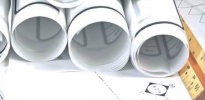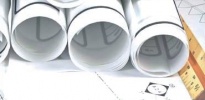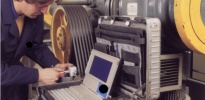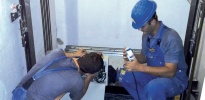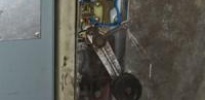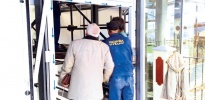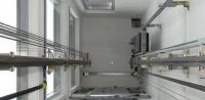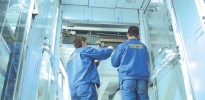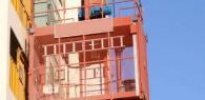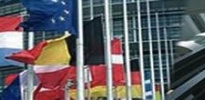Iné
EFESME - TECHNICKÉ NOVOSTI
Progress in the harmonisation of international safety parameters for lifts.
The last ISOTC 178/WG4-Task Force “Convergence”meeting took place at the end of August2012.
The document under revision, theI SO/TR 22559-2 “Safety parameters meeting the global essential safety requirements (GESRs)” is a technical report through which the convergence of safety requirements in national standards is periodically verified.
At the last meeting it was agreed that the convergence is expected to lead asmucha spossible towards those requirements indicated in the European standard pr EN 81-20,now under final revision.
Such a target is supposed to ensure a reasonably harmonised market, as expected by SMEs. It is important to make sure that the planned convergence does not introduce any requirements which might discriminate SMEs. Analogue situations have already been experienced at European level, during some meetings of CENTC 10 working groups. This is why a continuous contribution and participation in such meetings by NORMAPME experts is of the utmost importance for the active support of SMEs interests.
Further progress on the technical report will presumably be achieved during the next meeting taking place in London in January 2013.
EuropeanRegulationonstandardisation:whatarethebenefits forSMEs?
A month ago, the Council of the European Union finally adopted a regulation that promises to modernize and improve the European standardisation system and the competitiveness of enterprises.
The Council Resolution of the 4th October marks the end of a process that lasted more than two years, involving all EU institutions and in particular the European Parliament.
Interested stakeholders also participated in the discussions, in particular industry, environmentalists, consumers, trade unions, as well as small businesses and artisans.
It was essential to involve representatives of the companies in the review process,as they are the buyers and users of standards once they are released.
SMEs are considered the backbone of the economic system. However, they too often remain out of the regulatory processes due to the lack of resources, information and support.
The reform has re-affirmed the principle of national delegationon which the standardisation processis based, and therefore the central role of the National Standards Bodies. However, the regulation also aknowledged that certain interests that are weaker than others and less advantaged in a system of voluntary participation, should been couraged and supported. It is not only the case of SMEs, but also consumers, tradeunions and environmental interests. All these categories are protected by dedicated organisations that have direct access to technical committees of CEN, CENELEC and ETSI.
NORMAPME is proud of the official recognition received by these organisations.
SMEs will thus benefit from the support of a structure officially recognized by the reform to represent and protect their interests at various stages of the regulatory process.
Furthermore, as required in most occasions by representatives of SMEs who fear the excessive multiplication of standards in new are as and fields, the so-called" market relevance" principle has been largely endorsed by the Regulation. Indeed, the legislative text on several occasions stresses the need to consult interested parties before approving a standardisation initiative.
Thenew regulation on Europeanstandardisationwillcome into force on 1st January, 2013.
Progress in the harmonisation of international safety parameters for lifts.
The last ISOTC 178/WG4-Task Force “ Convergence” meeting took place at the end of August 2012.
The document under revision, the ISO/TR22559-2“Safety parameters meeting the global essential safety requirements(GESRs)”is a technical report through which the convergence of safety requirements in national standards is periodically verified.
At the last meeting it was agreed that the convergence is expected to lead as much as possible towards those requirements indicated inthe European standard pr EN 81-20, now under final revision.
Such a target is supposed to ensure a reasonably harmonised market, as expected by SMEs. It is important to make sure that the planned convergence does not introduce any requirements which might discriminate SME s. Analogue situations have already been experienced at European level, during some meetings of CENTC 10 working groups.This is why a continuous contribution and participation in such meetingsby NORMAPME experts is of the utmost importance for the active support of SMEs interests.
Further progress on the technical report will presumably be achieved during the next meeting taking place in London in January2013.
European Regulation on standardisation: what are the benefits forSMEs?
A month ago, the Council of theEuropean Union finally adopted a regulation that promises to modernize and improve the European standardisation system and the competitiveness of enterprises.
The Council Resolution of the4th October marks the end of a process that lasted more than two years, involving all EU institutions and in particular theEuropean Parliament.
Interested stakeholders also participated in the discussions, in particular industry, environmentalists, consumers, tradeunions, as well as small businesses and artisans.
It was essential to involve representatives of the companies in the review process, as they are the buyers and users of standards once they are released.
SMEs are considered the backbone of the economic system. However, they too often remain out of the regulatory processes due to the lack of resources, information and support.
The reform has reaffirmed the principle of national delegation on which the standardisation process is based, and therefore the central role of the National Standards Bodies. However, the regulational so aknowledged that certain interests that are weaker than others and less advantaged in a system of voluntary participation, should been couraged and supported. It is not only the case of SMEs,but also consumers, tradeunions and environmental interests.All these categories are protected by dedicated organisations that have direct access to technical committees of CEN, CENELEC and ETSI.
NORMAPME is proud of the officialrecognitionreceived bytheseorganisations.
SMEs will thus benefit from the support of a structure officially recognized by the reform to represent and protect their interests at various stages of the regulatory process.
Furthermore, as required in most occasions by representatives of SMEs who fear the excessive multiplication of standards in new areas and fields, the so-called " market relevance" principle has been largely endorsed by the Regulation. Indeed, the legislative text on several occasions stresses the need to consult interested parties before approving a standardisation initiative.
The new regulation on European standardisation will come into force on 1st January, 2013.
|
|
| ||||||
|
|
| ||||||
|
|
| ||||||
|
|
| ||||||
|
|
| ||||||
|
|
| ||||||
|
|
| ||||||
|
|
| ||||||
|
|
sídlo : Letná 27, 040 01 Košice
majiteľ : Pavol Tuchyňa
telefón : 00421-55-632 33 98
fax : 00421-55-632 33 83


